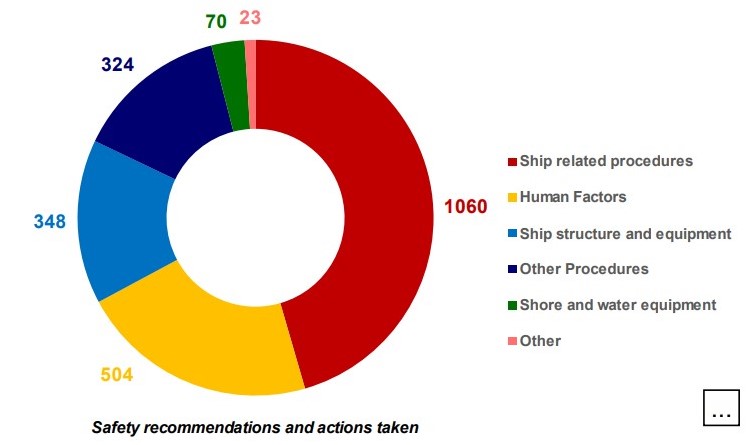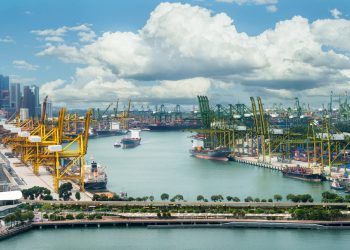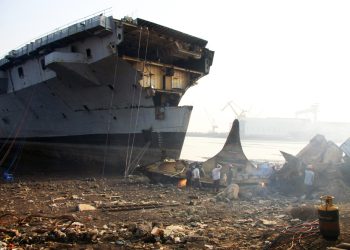EMSA published its Annual Overview of Marine Casualties and Incidents for 2022, informing that 2,637 marine casualties and incidents were reported.
In 2021, 2,637 marine casualties and incidents were reported, representing a reduction of 166 marine casualties and incidents in comparison with the year 2019, after a 6-year period of stable number of occurrences (average of 2,665 casualties between 2014 and 2019).
In addition , in 2021, the number of ships involved in marine casualties and incidents increased in comparison with 2020 and decreased in comparison to 2019 for all ship types excepting fishing vessels. For fishing vessels, the number of ships involved in marine casualties and incidents in 2021 decreased in comparison to 2020 and increased in comparison to 2019.
Ships involved in marine casualties and incidents
The average number of ships involved in reported marine casualties and incidents during the period from 2014 to 2021 is 1,400 for cargo ships, 635 for passenger ships, 510 for fishing vessels, 280 for service ships and 83 for other ships.
In 2021, the number of ships involved in reported marine casualties and incidents is under the average for cargo ships, passenger ships and service ships. The number of fishing vessels is over the average, but it is lower than in year 2020.
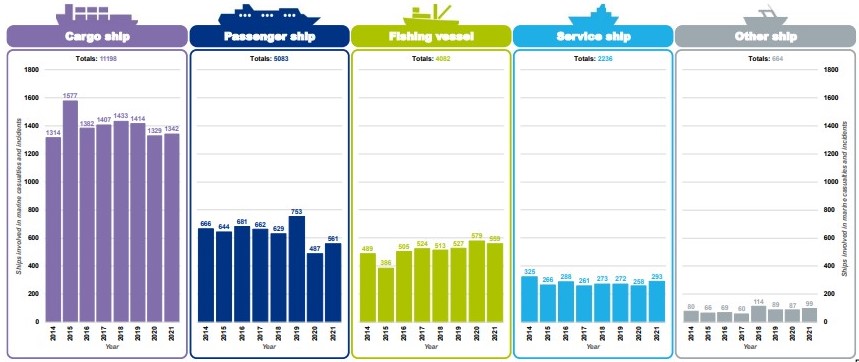
Location of marine casualties and incidents
From 2014 to 2021 more than half of the reported marine casualties and incidents took place in the ‘Internal waters’ area, followed by ‘Territorial sea’ and the ‘Open sea’ ones. Furthermore, the sub-category ‘Internal waters – port area’ was the area with more occurrences.
In 2021, ‘Internal waters’ is the area with 55.0% of the reported marine casualties and incidents, and the subcategory ‘Internal waters – port area’ – represents 39.2% of the occurrences. ‘Open sea’ and ‘Territorial sea’ locations represent respectively 17.9% and 17.7% of the reported marine casualties and incidents.
Compared to 2020, there is an increase in the number of reported marine casualties and incidents in the ‘Internal waters’ area, while the occurrences in ‘Open sea’ and ‘Territorial sea’ areas decreased.
Considering the voyage segment where the marine casualty or accident happened over the years, while the ‘Departure’ was the segment over the years with the lowest average of 8.4%, ‘en route’ phase is the segment with the highest average of 44.0%. ‘Anchored or alongside’, when the ship was not sailing, is the second segment with more occurrences with an average of 21.3%.
Trends are the same in 2020 and 2021, but in 2021 there is an increase in the voyage segment ‘en route’ and a decrease in the voyage segment ‘Anchored or alongside’.
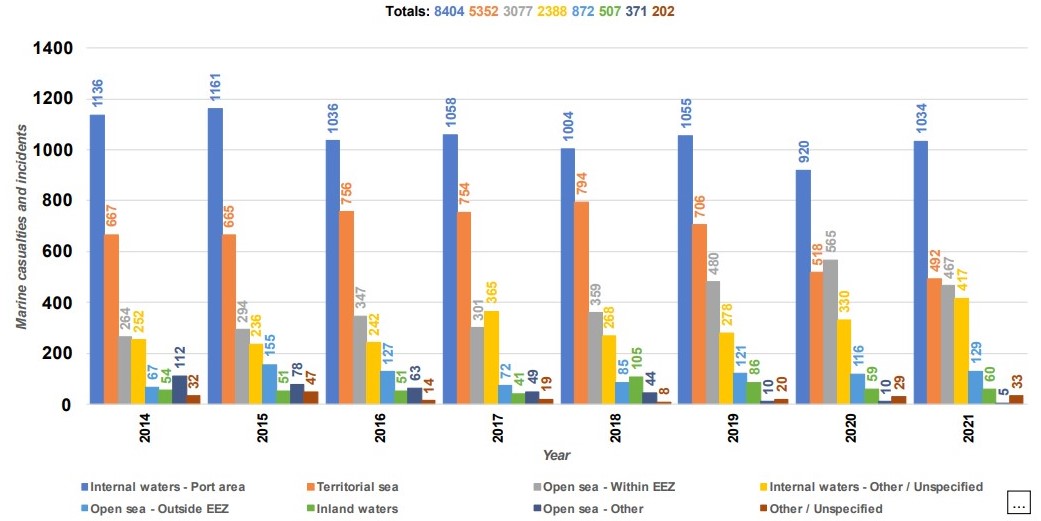
Safety investigations and investigation reports
The total number of safety investigations launched in the period from 2014 to 2021 is 984. There is a decreasing trend in the period, with the exceptions of years 2018 and 2019.
In the period from 2014 to 2021, on average, a safety investigation has been launched for 85.2% of the very serious marine casualties, for 6.4% of the serious marine casualties, for 0.7% of the less serious marine casualties and for 0.4% of the marine incidents.
In 2021 a safety investigation has been launched for 78.8% of the very serious marine casualties, for 4.3% of the serious marine casualties, for 0.8% of the less serious marine casualties and for 0.2% of the marine incidents.
Consequences of marine casualties and incidents
#1 Fatalities: In the period from 2014 to 2021 the total number of reported fatalities in marine casualties and incidents is 563, for 376 marine casualties, with a decreasing trend in the period.
The average in the period from 2014 to 2021 is of 70 fatalities per year. The higher value was reached in 2014 with 114 fatalities and the lower value is in 2021 with 36 fatalities.
Attending to the category of the person on board crew members represent 89.3%, other kind of person on board 7.0% and passengers 3.7% of the total fatalities.
#2 Injuries: In the period from 2014 to 2021 the total number of reported injuries is 5,394 marine casualties and incidents is 6,155, with a decreasing trend in the period.
The average in the period from 2014 to 2021 is 769 injuries per year. The higher value was reached in 2014 with 999 injuries and the lower value was in 2020 with 587 injuries. The total number of injuries in 2021 is of 621, a little higher than in 2020.
Attending to the category of the person on board crew members represent 84.6%, passengers 11.8% and other kind of person on board 3.6% of the total injuries.
Safety recommendations
‘Ship related procedures’ is the main focus area of the safety recommendations and actions taken reported since 2014, with 45.5% of the safety recommendations and actions taken, followed by ‘Human factors’ with 21.6%, ‘Ship structure and equipment’ with 15.0%, ‘other procedures’ with 13.9%, ‘Shore and water equipment’ with 3.0% and ‘Other’ with 1.0%.
For the focus area ‘Ship related procedures’, 42.9% of the safety recommendations and actions taken are in the subcategory ‘Operation’.
Regarding the focus area ‘Human factors’, 45.1% of the safety recommendations and actions taken are in the subcategory ‘training, skills and experience’.
For the focus area ‘Ship structure and equipment’, 37.9% of the safety recommendations and actions taken are in the subcategory ‘ship equipment/system’.
Concerning the focus area ‘Other procedures’, 40.4% of the safety recommendations and actions taken are in the subcategory ‘compliance’ (regulations/legislation).
For the focus area ‘Shore and water equipment’, 38.6% of the safety recommendations and actions taken are in the subcategory ‘Other equipment’.
‘Owner/company’ is the main addressee, with 54.5% of the safety recommendations and actions taken, followed by ‘Maritime Administration’, with 19.9% of the safety recommendations and actions taken.
